Dentures - Powell, OH
Replace Any Number of Missing Teeth

Whether your tooth loss consists of a single gap in your smile or an entire row of teeth, the need for replacement is vital to your oral health, your general health and your overall well-being. We know your first concern is probably the way your smile looks because that can have a lot to do with your sense of self-confidence. Beyond that, however, there are very real health concerns, too. At Wedgwood Complete Dentistry, we offer dentures in Powell, OH, so you can once again have a complete smile that is as beautiful as it is functional. Depending on the extent of tooth loss you have, our dentists can talk to you about a partial or full denture, as well as implant-supported dentures.
Why Choose Wedgewood Complete Dentistry for Dentures?
- Implants Placed and Restored In-House
- Carefully Personalized Full and Partial Dentures
- A Skilled, Knowledgeable, Caring Dentist
The Consequences of Tooth Loss

For most people, the appearance of a missing tooth is enough to convince them to see the dentist in Powell for dentures. But did you also know that just a single missing tooth increases the likelihood of cavities in your remaining teeth as well as the odds that you’ll develop gum disease? In addition, missing teeth often lead to bite problems as other teeth shift to take up the vacant spaces. Last but not least, each and every tooth in your mouth has a vital role to play in chewing and digestion. Consequently, tooth loss can inadvertently cause varying degrees of malnutrition.
Who’s a Good Candidate for Dentures?

For patients who are struggling with missing all of their teeth, dentures can be the essential treatment they need to help restore their entire bite. Even so, our team will need to thoroughly evaluate your oral health to determine if this tooth-replacement option will be right for you. Additionally, we’ll be glad to discuss alternative methods for rebuilding your smile, including dental bridges and implants. Keep reading to learn what makes a good candidate for dentures.
Effects of Missing Teeth
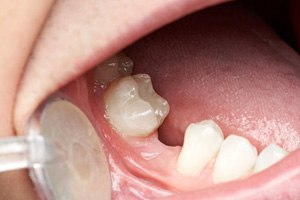
Tooth loss can occur for any number of reasons—from medical conditions or accidental injuries to gum disease and poor oral hygiene. In any case, there are usually various downsides that you may experience from the situation. Not only will your oral health be negatively impacted, but your mental well-being can also be affected if you don’t address the issue.
Any remaining natural teeth will begin to shift out of place to close the gaps in your smile while your jawbone can start to shrink due to a lack of stimulation from tooth roots. On top of that, you might feel less confident about your appearance, increasing the risk of depression and an unwillingness to participate in social interactions. For this reason, having a convenient way to restore your bite like dentures can be the solution you’ve been looking for to improve both your oral and overall health.
What Qualifies You for Dentures?

In most cases, adults who have experienced tooth loss of any kind can be eligible for traditional dentures. Our options typically involve full and partial prosthetics depending on how many teeth you need replaced. During your initial consultation, our team will evaluate your oral health and check for certain qualifying factors, including:
- The extent of tooth loss (partial dentures will be recommended if you’re only missing several of your teeth)
- Your oral health (if you have underlying or growing oral health complications, we’ll need to address them before moving forward with denture treatment)
- If you need preliminary services (such as gum disease treatment, tooth extractions, or bone grafting)
Alternative Tooth-Replacement Options
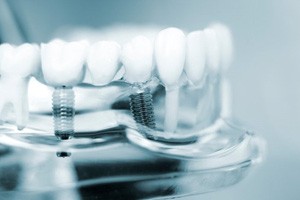
Even if dentures aren’t in the cards for you, this doesn’t mean you’ll be out of solutions for rebuilding your full smile. At Wedgewood Complete Dentistry, we offer alternative treatments to help you replace missing pearly whites so that you can enjoy a comfortable bite and a natural-looking grin again. Our other options include:
- Dental bridges – This tooth-replacement solution is mostly reserved for patients who are missing one or three teeth in a row. Dental bridges consist of two dental crowns that sit atop abutment teeth on either side of the gap, which are connected via pontics (artificial teeth). This procedure involves removing a small amount of the enamel from the abutment teeth to make space for the prosthetic. With proper care, your results can last 10 years or more before needing to be replaced.
- Dental implants – Instead of resting on your gums or natural teeth, dental implants can be embedded directly into your jawbone to maximize the strength and stability of your restoration(s). After recovering from the procedure, you’ll be able to renew your bite with a dental crown, bridge, or dentures, and your results could last decades to a lifetime with minimal care.
Types of Dentures in Powell

Now that we’ve established the importance of replacing missing teeth, let’s take a look at the types of dentures available. The right one will surely make you smile!

Partial Dentures
Partial dentures are a type of prosthetic that can be ideal for the patient who is missing one or two teeth. Even if your missing teeth are not consecutive, we can still design a single partial denture that fits between remaining teeth. The partial consists of false teeth attached to a metal frame. Clips on the frame hook around adjacent teeth to hold the partial in place.

Full Dentures
Full dentures today are not like grandma’s. Thanks to new materials and advances in prosthetic production, your dentures will look like natural teeth and feel comfortable and secure in your mouth. Our dentists take precise measurements to ensure your complete satisfaction. Give yourself a few weeks to adjust to how dentures feel and in short time you’ll hardly notice them.

Dental Implant-Supported Dentures
If you really want to have dentures that are natural looking and secure, then consider implant-supported dentures. Dental implants that are surgically implanted along your jaw hold the dentures in place. You can select permanent dentures or overdentures that you remove to clean and soak every night.
How Dentures Are Made?
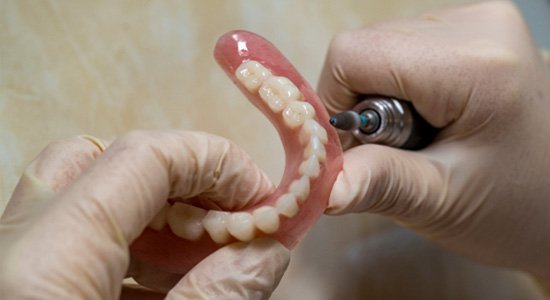
Everyone’s smile is entirely different, so dentures are all custom-made for each person. This means that it requires a multi-step process to ensure that your prosthetic looks and feels great! Continue reading to learn about what makes up dentures and how they are created.
What Are Dentures Made Of?
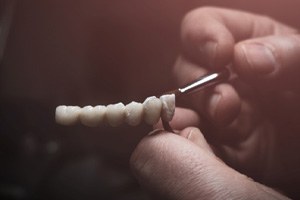
Dentures are comprised of two separate parts – the base and the replacement teeth. Here’s what each one looks like:
- Base: The base of the dentures is the structure that supports the replacement teeth. It can be made from a variety of different materials, like acrylic, nylon, and resin. In most cases, acrylic is chosen because it can be tailored to closely resemble gum tissue. This results in a more natural appearance.
- Teeth: The replacement teeth are secured onto the denture base. Most of the time, the teeth are made from resin or porcelain because they look and feel just like tooth enamel. It even similarly reflects light. Since porcelain can be abrasive against natural teeth, it is usually only recommended for dentures.
The Denture Creation Process
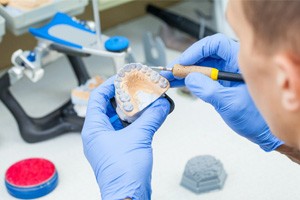
- Your dentist will start by taking measurements of your jaw and impressions. This is used to create a model that is the exact size and shape of your mouth.
- The model is sent to the dental laboratory where your dentures will be made. First, a wax replica of your gumline is created. Then, the replacement teeth are set into place using a mechanical device called an “articulator.” Adjustments are made by a lab technician.
- These wax dentures are sent back to your dentist for a fitting. If everything looks good, they are returned to the dental lab to finish the process.
- After the dentures are back in the lab. The wax needs to be replaced with acrylic. To achieve this, the lab technician placed the dentures into a flask. Plaster is poured in to maintain the shape of the dentures. Then, the entire flask is placed in hot water to melt away the wax.
- The plaster is carefully removed from the dentures using dental tools. The dentures are then placed into an ultrasonic bath to wash away the rest of the plaster.
- Any excess acrylic is cut away from the dentures. Then, they are polished to perfection.
- Now that your dentures are finished, they are returned to the dental office so you can try them on. If you and your dentist are happy with the results, you can leave showing off your new, complete smile!
Adjusting to Your New Dentures

After you get your dentures, you may experience some soreness, but this is nothing to worry about. Temporary discomfort is completely normal and common as one adjusted to their new prosthetic. After some time, your dentures will start to feel more and more like your natural teeth. Remember to stick to softer foods and exercise your facial muscles at this time. If discomfort persists or you have concerns about your dentures, don’t hesitate to give us a call.
The Benefits of Dentures

The saying goes you don’t know what you’ve got until it’s gone, and that is certainly true when it comes to teeth. If you’ve lived any amount of time with an incomplete smile, you know these various struggles. Compared to being without them, life with dentures can be so much more rewarding in so many ways, including practical communication, eating, and looking and feeling your best. You don’t have to suffer—get your own custom dentures here at Wedgewood Complete Dentistry. They’ll give you plenty of reasons to smile again.
Psychological Benefits
Tooth loss not only has many health pitfalls but also often comes as a blow to self-esteem. You may feel too self-conscious to smile, talk, or eat in front of others for fear that they’ll see gaps in your mouth. However, dentures can give you back confidence and a feeling of self-worth. Not to mention that letting your smile show more often can give you a positive mental health boost!
Clearer Enunciation
Multiple sounds in languages involve your teeth. Just try saying words with t, d, s, or th sounds sans teeth! You’ll find that communication with others can become more challenging. Dentures allow you to form sounds with more clarity. Although it may take a little bit of time upfront to adjust to your prosthetic teeth, you should quickly be able to talk and communicate better.
Improves Nutrition
Although there are soft foods that contain nutrients, such as eggs, yogurt, and applesauce, not having teeth can severely limit what foods you can eat. Dentures, on the other hand, can enable you to enjoy a more balanced diet again, especially if your dentures are attached to dental implants. With teeth to break down your food, you can have easier digestion as well, helping you feel healthier and improving your quality of life.
Preserves Oral Health
If you still have some remaining teeth in your mouth, wearing a partial denture will help to keep them properly spaced and in as good condition as possible. When you take good care of your denture and your teeth, you can hold onto your natural smile and overcome the loss you’ve already experienced.
Expands Opportunities
Would you like to apply for a better job? Want to meet new people? Are you looking for a romantic partner? Tooth loss can stand in the way of all these goals. Studies show that those who have missing teeth are more likely to be judged negatively based on their appearance than those with a full set. So, if you want to make a powerful good impression and have new opportunities, it pays off to complete your smile with dentures.
Understanding the Cost of Dentures

At Wedgewood Complete Dentistry, we don’t offer one-size-fits-all dentures because each mouth is different. Every patient’s denture is customized to their needs and can vary in cost from the next denture case. As a result, we aren’t able to give out an estimate for dentures until Dr. Eskridge has inspected your mouth and created a plan designed specifically for you. During your consultation, we’ll be happy to go through all the financial details with complete transparency so that you know what to expect in terms of the cost.
Factors That Affect the Cost of Dentures

When we consider the pricing of your denture(s), we take several factors into account, including the following:
- The type of denture: partial, full, or implant.
- The number of teeth being replaced.
- Whether your partial denture has metal or acrylic clasps.
- Whether you need any preliminary work like gum disease treatment, tooth extractions, implant placement, etc.
If you have questions about the cost, we can break it down for you.
Are Implant Dentures More Expensive?

Yes, in general, implant dentures tend to cost more than traditional dentures, but in this case, you get what you pay for. With the additional cost comes a myriad of benefits that normal dentures can’t provide, such as a stronger bite, longevity and durability, more comfort and confidence, and easy maintenance—just to name a few. Many patients who choose implant dentures find that their replacement teeth are well worth the extra upfront cost for these priceless results to extend the lifespan of their restored smile.
Does Dental Insurance Cover Dentures?

There may be some exceptions, but dental insurance typically does include coverage for dentures. Usually, plans will pay about half of the total cost for the these more advanced restorations, which means the other half will come out of your own pocket. After your treatment plan has been created, we will look at your insurance policy and try to maximize the benefits you’re entitled to.
Other Options for Making Dentures Affordable

What if you can’t or don’t want to pay for your dentures all upfront? Most households don’t have a huge savings cushion for somewhat larger expenses. You can apply for flexible financing, which will allow you to make monthly payments that are smaller and easier to manage in your budget over time. If you need help at any stage of the application process, we can help and try to answer your questions.



